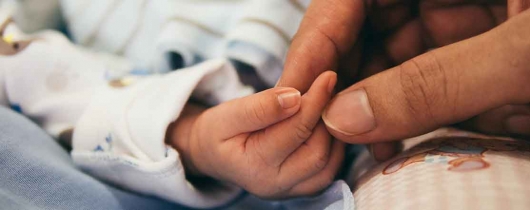Day of Prayer for the Legal Protection of Unborn Children

Today is the 48th anniversary of Roe v. Wade, the decision of the Supreme Court of the United States that held that the right to abortion, subject to some limitation and regulation by the state, is guaranteed under the Constitution. The Court’s decision was based on a series of prior cases (e.g., Griswold v. Connecticut) that created from the “penumbra” of the Bill of Rights a fundamental right to privacy. In affirming the personhood of the pregnant woman, it denied the personhood of the developing life within her. That fundamental conflict is a significant reason why abortion is still far from a settled issue.
Jesus, the minister of God’s new covenant with people and the one who appointed apostles to share in his ministry of preaching, teaching, and healing, never directly addresses the issue of abortion in the gospels. But the gospels also reveal him as one who believed in the fundamental human dignity of women and children and a champion of the most vulnerable and marginalized members of society.
Like just about everything these days, the annual March for Life and similar events are being circumscribed by the realities of the coronavirus. It won’t be feasible or necessary to spend a lot of time, energy, money, and other resources organizing large public demonstrations. Perhaps it is an opportunity to reflect on how we can better promote and build a Culture of Life, one that more effectively uses Catholic Social Teaching to create a society where every human life, from the moment of conception to natural death, is treated as sacred. Jc
-------------------------------------------------------------------------------------------------------------------
22 de enero de 2021
Día de Oración por la Protección Legal de los Niños No Nacidos (EE.UU.)
Hebreos 8:6-13; Marcos 3:13-16
Hoy es el 48º aniversario de Roe c. Wade, la decisión del Tribunal Supremo de los Estados Unidos que sostuvo que el derecho al aborto, sujeto a cierta limitación y regulación por parte del Estado, está garantizado por la Constitución. La decisión del Tribunal se basó en una serie de casos anteriores (por ejemplo, Griswold c. Connecticut) que crearon a partir de la "penumbra" de la Declaración de Derechos un derecho fundamental a la intimidad. Al afirmar la personalidad de la mujer embarazada, negó la personalidad de la vida en desarrollo dentro de ella. Ese conflicto fundamental es una razón significativa por la que el aborto está aún lejos de ser una cuestión resuelta.
Jesús, el ministro del nuevo pacto de Dios con el pueblo y el que designó apóstoles para compartir su ministerio de predicación, enseñanza y curación, nunca aborda directamente el tema del aborto en los evangelios. Pero los evangelios también lo revelan como alguien que creía en la dignidad humana fundamental de las mujeres y los niños y un defensor de los miembros más vulnerables y marginados de la sociedad.
Como casi todo en estos días, la Marcha por la Vida anual y eventos similares están siendo circunscritos por las realidades del coronavirus. No será factible ni necesario gastar mucho tiempo, energía, dinero y otros recursos en la organización de grandes manifestaciones públicas. Tal vez sea una oportunidad para reflexionar sobre cómo podemos promover y construir mejor una Cultura de la Vida, una que utilice más eficazmente la Doctrina Social Católica para crear una sociedad en la que cada vida humana, desde el momento de la concepción hasta la muerte natural, sea tratada como sagrada. jc




